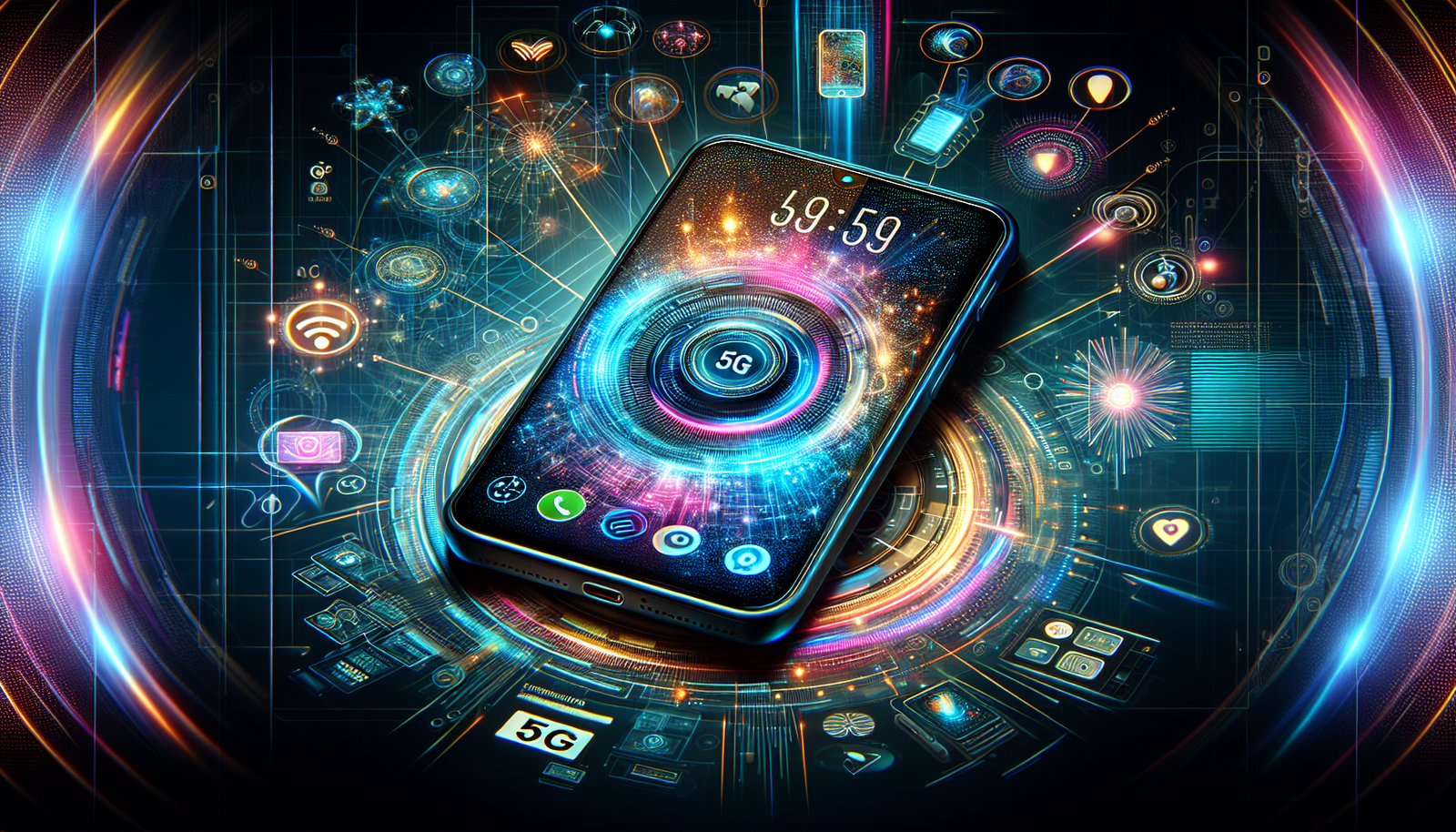Have you ever wondered how rapidly advances in technology shape the way we communicate? I often find myself thinking about how the world has transformed with innovations, particularly the rise of 5G technology. In today’s fast-paced environment, understanding how these changes impact communication is essential, not just for tech enthusiasts but also for everyday individuals like me.
What is 5G Technology?
5G technology is the fifth generation of mobile telecommunications systems, succeeding 4G. It promises faster data transfer speeds, reduced latency, and the ability to connect a vast number of devices simultaneously. I find it fascinating to know that 5G isn’t just about speed; it’s about enabling new possibilities in communication, connectivity, and even how we interact with the world around us.
Key Features of 5G
To grasp the potential of 5G, it helps to break down its key features:
| Feature | Description |
|---|---|
| Speed | 5G can deliver download speeds up to 20 Gbps, making it significantly faster than 4G. |
| Latency | It offers ultra-low latency, around 1 millisecond compared to 50 milliseconds for 4G. |
| Capacity | 5G can handle millions of devices in a square kilometer, perfect for densely populated areas. |
| Reliability | Enhanced reliability ensures consistent connectivity, even in crowded environments. |
| Energy Efficiency | Designed with energy efficiency in mind, it reduces the energy required for transmitting data. |
When I think about these features, I am buoyed by the possibilities they open, not just for personal communication but for industries as well.
How 5G Is Changing the Way We Communicate
With the rollout of 5G technology, communication has taken on a whole new dimension. I’ve been amazed by how it influences various sectors, including business, healthcare, and entertainment.
Enhanced Mobile Communication
For mobile communication, 5G has made our conversations clearer, faster, and more reliable. I appreciate being able to connect with my friends and family without interruptions, no matter where they are. The user experience stands to benefit enormously from reduced buffering times during calls or video chats.
Remote Work Revolution
The transition to remote work has been greatly influenced by the capabilities of 5G. I can effortlessly attend virtual meetings, share large files quickly, and communicate in real-time with colleagues around the globe. The speed and reliability of 5G make remote collaboration more efficient, helping us to overcome the geographical barriers that used to hinder our productivity.
Impact on Healthcare
In the healthcare sector, 5G technology has the potential to change how medical professionals communicate and operate. Telemedicine has become more accessible, and I find it comforting knowing that healthcare providers can now access real-time data from patients remotely. This capability could lead to faster diagnostics and treatment, which is incredibly valuable in emergencies.
| Telehealth Benefit | How 5G Helps |
|---|---|
| Remote Monitoring | Enables physicians to monitor patients’ health metrics in real-time. |
| Faster Data Transfer | Allows for quicker transmission of medical images and patient data. |
| Enhanced Virtual Care | Facilitates high-quality video consultations without delays or drops. |
Overall, the potential to improve healthcare outcomes through enhanced communication is something that excites me about the future.
IoT and 5G Communication
The Internet of Things (IoT) is another domain where 5G technology shines. With the ability to connect more devices than ever before, 5G creates a network of smart devices that communicate with one another seamlessly.
What is IoT?
IoT refers to the network of connected devices that communicate and exchange data over the internet. This technology has revolutionized various fields, including smart homes, agriculture, and transportation.
5G’s Role in IoT
5G plays a critical role in enabling IoT devices to function optimally:
| IoT Category | 5G Enhancements |
|---|---|
| Smart Homes | Allows devices like smart thermostats and appliances to communicate efficiently. |
| Smart Agriculture | Enables real-time monitoring of crops, soil conditions, and livestock health. |
| Connected Vehicles | Provides vehicles with real-time data for navigation, traffic management, and safety features. |
I can imagine future scenarios where my fridge alerts me when I’m low on groceries or where farmers can monitor crop health from their smartphones.
The Role of 5G in Media and Entertainment
The way we consume media has transformed significantly over the last decade, and I see 5G amplifying these changes even further. It opens the door to consuming high-definition content without buffering.
Streaming Services
With 5G, streaming services can deliver high-quality video at lightning speeds. I enjoy binge-watching shows without the annoyance of pauses for buffering, and the benefits increase as more people access content simultaneously without affecting the quality.
Virtual and Augmented Reality
5G also plays a significant role in developing virtual reality (VR) and augmented reality (AR) experiences. These technologies require real-time data, and 5G can provide the necessary bandwidth and low latency to make them viable. Whether it’s playing immersive games or experiencing virtual travel, the future looks exciting.
| Application | How 5G Enhances Experience |
|---|---|
| Gaming | Allows for real-time interaction in multiplayer games without lag. |
| Virtual Tours | Enables seamless navigation through virtual environments in real-time. |
| Interactive Learning | Provides instantaneous access to educational content in virtual classrooms. |
I’m looking forward to immersing myself in amazing experiences that previously seemed only possible in science fiction!
The Potential Challenges of 5G Technology
While the advantages of 5G technology are numerous, I can’t help but discuss some challenges we may face in adopting this technology universally.
Infrastructure Requirements
One of the primary challenges is the need for a robust infrastructure. 5G technology relies on a network of small cell towers, which means that cities will need to invest heavily in new equipment and installations. It’s a significant feat, but one that is essential for realizing the full potential of 5G.
Cybersecurity Concerns
With increased connectivity comes heightened risks in cybersecurity. I understand this reality, as more connected devices can lead to vulnerabilities that hackers can exploit. Ensuring robust security measures will be vital to protect sensitive data.
| Challenge | Consideration |
|---|---|
| Infrastructure Costs | Cities need to allocate significant funds for building 5G networks. |
| Cybersecurity Threats | Increased vulnerability of devices can lead to data breaches. |
Maintaining a balance between advancing technology and safeguarding against threats will require concerted efforts from governments, corporations, and individuals alike.
Digital Divide
While 5G technology has the potential to enhance communication for many, there’s a risk of widening the digital divide. Not everyone has equal access to technology, and if we’re not careful, those in underserved areas could be left behind. I believe it’s crucial to promote equitable access to technology for everyone to benefit from advancements.
The Global Impact of 5G
Around the world, 5G technology is poised to affect economies and societies in various ways. I am excited to see the global implications of this communication revolution.
Economic Growth
The implementation of 5G technology is set to significantly contribute to economic development. According to estimates, it could add trillions to the global economy as industries harness its potential.
| Sector | Impact of 5G |
|---|---|
| Manufacturing | Enhancements in automation, leading to increased productivity. |
| Transport and Logistics | Improved supply chain management through better tracking. |
| Retail | Enables innovative customer experiences and services. |
I believe the economic benefits could be transformative, especially as businesses adapt to remain competitive.
Social Change
Beyond economics, 5G technology has the potential to promote social change. With better communication capabilities, communities can engage more effectively in social movements and initiatives. I see this as a powerful tool for fostering unity and collaboration in addressing pressing issues.
The Future of Communication
Looking ahead, I’m optimistic about the future of communication in the 5G era. As advancements unfold, I can foresee several exciting trends:
Increased Personalization
As companies leverage data analytics and AI in combination with 5G technology, we can expect a more personalized approach to communication. From targeted advertisements to customized content delivery, the experience could become more relevant to our individual preferences and needs.
Enhanced Interactivity
We’ll likely see a shift toward more interactive forms of communication. With the capabilities of 5G, I envision smart devices engaging in meaningful ways, responding not just to my commands but adapting to my habits and routines. Imagine your home adjusting to your preferences automatically!
Global Connectivity
5G technology has the potential to enhance global connectivity, breaking down barriers between regions. It could facilitate cross-border collaborations, allowing individuals and organizations to engage in projects that transcend geographical constraints. The possibilities for global partnerships are limitless, making the world feel more connected than ever.
Embracing the 5G Revolution
As I reflect on the transformative potential of 5G technology, I am excited yet considerate of the challenges that lie ahead. Embracing this revolution requires collaboration, innovation, and a collective commitment to harnessing technology for the common good.
Staying Informed
Staying informed about the latest advancements in 5G will allow me to adapt to the changing landscapes of communication. I plan to take an active role in understanding how these innovations can benefit my daily life, whether in personal communication or professional environments.
Advocating for Inclusivity
As we progress into this new era, I feel compelled to advocate for inclusivity. This means supporting initiatives that ensure everyone, regardless of their background or geographical location, can access the advantages of 5G technology.
Conclusion
Communication has come a long way, and the advent of 5G technology is set to accelerate this evolution even further. From enhancing personal interactions to transforming industries, the implications are profound. I am thrilled about the future, as it holds the promise of smarter, faster, and more integrated ways to connect. As we navigate this exciting journey, let’s remain mindful of the challenges we face and work together to create an inclusive, connected world that benefits everyone.






